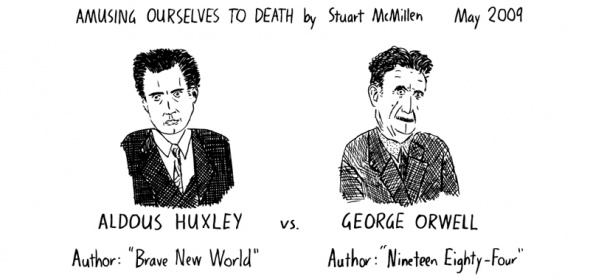Staff Writer
[pullquote1 quotes=”true” align=”center”]No Pudding Tonight[/pullquote1]
Every day we find ourselves bombarded by advertisements of all kinds and we go about our lives doing our best to ignore them, as is the norm, but could we be missing something?
I recently came across a comic by Stuart McMillen entitled “Amusing Ourselves to Death,” debating which novel comes closer to our potential doomsday society: Brave New World or 1984?
One novel warns against depriving information and striking fear into the people, while the other warns against over-enjoyment in a lazy society. The final strip tells, “In short, Orwell feared that what we hate will ruin us/Huxley feared that what we love will ruin us.”
If we live in a world where all information is free and we can instantly load a webpage to see catastrophes happening in other countries, how important is this new, upsetting information in relation to our own daily lives? How concerned should we be for these problems that we’ve never seen before? We get to hear directly from the people who have been affected by war and famine, abused by dictatorships, and ignored by the rest of the world.
Meanwhile, one could rebut right away with “we have our own problems,” and, of course, we all do have our own problems. We have our own nation and communities to put before anyone else, but it must still concern us to know every day there’s a whole world out there with problems greater than any you have ever faced. But in the end, how much can we give? And should we give? If you can give to people from around the world, why wouldn’t you give even more for your own community?
People are no longer separate when we can see them in real time and real color. We see third world nations condemned to sickness and hunger, being oppressed by their leaders — and we want to help them, because they must be living in a version of Orwell’s novel.
Like the Invisible Children, they must be the ones forced to use weapons via pain and punishment and given false information so they’ll revolt against those who want to help.
Despite political disputes about this particular topic, this is the image we conjure when we think of those poor people who deserve to live like any other human being, but what does that make us? Are we the knights in shining armor, galloping around the globe to save a country, or are we Huxley’s warned nation being drowned in a sea of irrelevancy?
We hear “save the whales,” “protect tigers,” “stop world hunger,” be a better person, become a better community and become a better world, but what does this even mean to us? We think that we are so aware because we have this access available at a single click and a YouTube video with millions of views, but does it ever stick? You think “Cool video, I’m gonna share that,” and then it’s gone. Weeks go by and it’s gone from your stream and you forget about it like it was old news.
Right now, what is happening with the Arizona School Board concerning the banning of books? According to a recent bill, they are no longer allowing any book that may “promote the overthrow of the United States Government, promote resentment toward a race or class of people, are designed primarily for pupils of a particular ethnic group, [and] advocate ethnic solidarity instead of the treatment of pupils as individuals.” Even Shakespeare’s “The Tempest” is banned as well as an entire Mexican-American culture program.
How can we recognize and respect each other as individuals if we aren’t allowed to learn about each other’s backgrounds? Why is it a fear that children would want to overthrow the government? McMillen’s comic concludes Huxley’s fears have overtaken us, as we no longer can see through the propaganda to what we really need to focus on. Yes, world hunger is a problem, but this is what happens when we look away from our own issues.
Link to Stuart McMillen’s comic: Amusing Ourselves to Death
